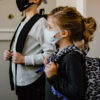In January, East Coast Prison Justice Society (ECPJS) called on government to renew its efforts to protect people incarcerated in provincial jails and correctional staff from COVID-19. At that time, we had three major concerns:
1. Government has been silent on the need to prioritize incarcerated populations and correctional staff for COVID-19 vaccination;
2. In-custody numbers have risen to pre-pandemic levels (with approximately 70-75% of those inside remanded to custody pre-trial);
3. Through no fault of their own, prisoners have been subjected to ongoing, indefinite lockdowns and solitary confinement causing serious harm to mental and physical health, and human rights.
We received no response.
Now, with the sudden uptick in COVID-19 cases and community spread exceeding the first wave, we return to our basic concerns for prisoner safety and public health. We are alarmed to learn that there has been no vaccination rollout either for provincial prisoners or correctional staff, despite prisons being obvious vectors of community and institutional co-transmission, and the heightened vulnerability & disproportionate numbers of Indigenous, racialized, and disabled prisoners.
This is contrary to government’s statements that Phase Two of the vaccine rollout would include “those who live in large group settings and those who work directly with them, including correctional facilities, shelters and temporary foreign workers’ quarters.” Indeed, we are unable to confirm that even prisoners who already qualify by age have had the opportunity to be vaccinated.
Further, as COVID-19 numbers rise, we are aware of renewed government discussions about a mass release of provincially incarcerated people comparable to the 40% reduction in the jail population a year ago. Given the high risk of spread in provincial jails, where social distancing is impossible and staff and prisoners are constantly circulating in and out of community; the high risk of serious health impacts given disproportionate representation of chronic underlying health conditions among prisoners; and the high risk of intensified lockdowns and consequent grievous harm to prisoner health and human rights should staffing be further reduced by community or institutional spread, we agree that rapid mass decarceration is urgently necessary at this time.
However, no efforts have been made to support the readiness of our aligned service organizations — Elizabeth Fry Societies, Coverdale Courtwork Society, or John Howard Society – who, as “JEC,” came together during the first wave to facilitate housing and other supports and otherwise enabled compliance with public health protocols for those subject to rapid release. For instance, residents and staff living and working in supported housing run by Elizabeth Fry and Coverdale have not been granted priority access to vaccinations as a result of shelter or group home status.
We urge government to take measures to effect mass release to mitigate the risks of institutional and further community spread. Moreover, access to vaccinations is required for prisoners and staff currently in correctional facilities, as well as residents and staff of transition houses. Last, frequent COVID-19 testing both in correctional facilities and transition houses is necessary to protect against asymptomatic spread.
Will government respond to us and to the prisoners and correctional and community staff/residents awaiting vaccination? Will it share the measures it is taking inside correctional facilities to protect against infection spread, while respecting human rights and refraining from prolonged and indefinite isolation constituting torture in Canadian law? Will it include community-based service organizations in planning to ensure that the most vulnerable prisoners are accommodated in any imminent mass release?
We are calling on the Department of Justice / Correctional Services, Nova Scotia Health Authority and the Chief Medical Officer of Health, Dr. Strang, to:
1. Offer vaccinations to prisoners and staff in correctional facilities and staff and residents of transition houses commencing this week;
2. Ensure frequent COVID-19 testing of correctional staff and prisoners and transition house staff and residents;
3. Promote mass release by re-instituting expedited bail hearings and bail reviews, including on weekends and by video/phone, and use of statutory powers to effect conditional release of sentenced persons;
4. Collaborate with the non-profit sector (including Elizabeth Fry Societies, Coverdale Courtwork Society and John Howard Society) to provide short- and long-term supports for persons released from detention and alternatives to pre-trial detention (“bail beds”) as well as supports for East Coast Forensic Hospital patients granted community release.



